
Manilkara is a genus of trees in the family Sapotaceae. They are widespread in tropical and semitropical locations, in Africa, Madagascar, Asia, Australia, and Latin America, as well as various islands in the Pacific and in the Caribbean. A close relative is the genus Pouteria.
Bonania is a plant genus of the family Euphorbiaceae first described as a genus in 1850. It is native to the West Indies.
- Bonania cubanaA.Rich. - Bahamas, Cuba
- Bonania domingensis(Urb.) Urb. - Haiti, Dominican Rep
- Bonania ellipticaUrb. - Cuba
- Bonania emarginataC.Wright ex Griseb. - Cuba
- Bonania erythrosperma(Griseb.) Benth. & Hook.f. ex B.D.Jacks. - Cuba
- Bonania linearifoliaUrb. & Ekman - Haiti
- †Bonania myricifolia(Griseb.) Benth. & Hook.f. - Guantánamo but extinct

Pectis is a genus of flowering plants in the family Asteraceae described as a genus by Linnaeus in 1759.

Amyris is a genus of flowering plants in the citrus family, Rutaceae. The generic name is derived from the Greek word αμυρων, which means "intensely scented" and refers to the strong odor of the resin. Members of the genus are commonly known as torchwoods because of their highly flammable wood.

Casasia is a genus of flowering plants in the family Rubiaceae. These shrubs or small trees occur on the Caribbean islands and in one case in Florida. Some of the ten accepted species were formerly placed elsewhere, e.g. in the related genip-tree genus (Genipa), in Gardenia or in Randia.
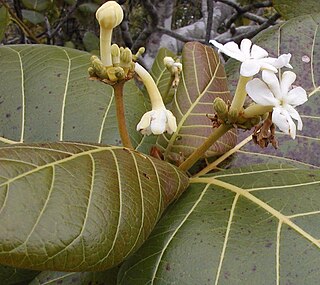
Guettarda is a plant genus in the family Rubiaceae. Most of these plants are known by the common name velvetseed.
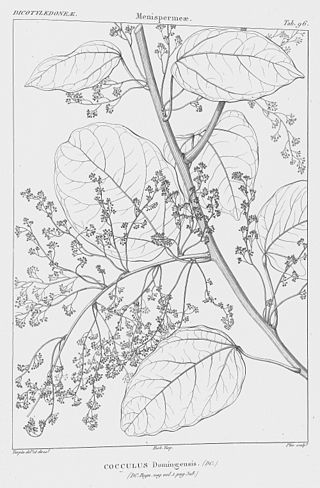
Hyperbaena is a genus of plants in family Menispermaceae. It includes 23 species native to the tropical Americas, ranging from Cuba and southern Mexico to northeastern Argentina.
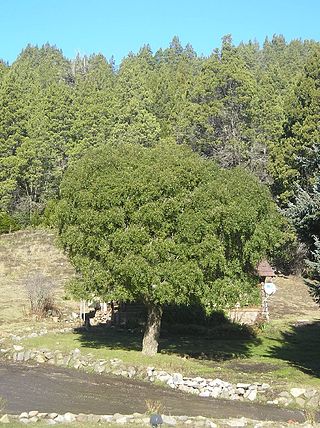
Maytenus is a genus of flowering plants in the family Celastraceae. Members of the genus are distributed throughout Central and South America, Southeast Asia, Micronesia, and Australasia, the Indian Ocean and Africa. They grow in a very wide variety of climates, from tropical to subpolar. The traditional circumscription of Maytenus was paraphyletic, so many species have been transferred to Denhamia and Gymnosporia.

Picramnia, the bitterbushes, is a genus of flowering plants generally placed in the family Picramniaceae, but sometimes included in Simaroubaceae. The name is conserved against the genera Pseudo-brasiliumAdans., and TaririAubl., both which have been rejected.
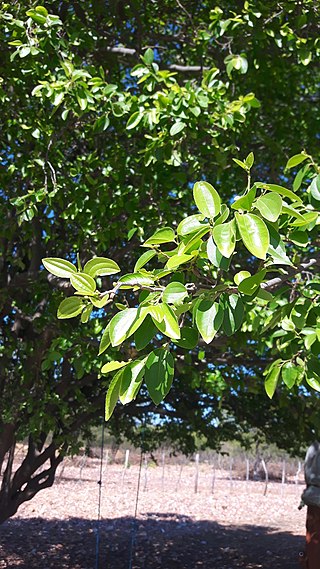
Sarcomphalus is a genus of plants in the family Rhamnaceae.

Wallenia is a genus of flowering plants in the family Primulaceae endemic to the West Indies. It is composed of 29 species. It also includes a subgenus, Homowallenia, with ten species from the northern Caribbean.

Rondeletia is a genus of flowering plants in the family Rubiaceae. It is endemic to the Neotropics. There are around 160 species.

Galactia is a genus of plants in the legume family (Fabaceae). It belongs to the subfamily Faboideae and tribe Diocleae They do not have an unambiguous common name, being commonly called milk peas, beach peas or wild peas. They are perennial herbs or subshrubs with prostrate, climbing, or erect forms.

Chaptalia is a genus of flowering plants in the family Asteraceae.
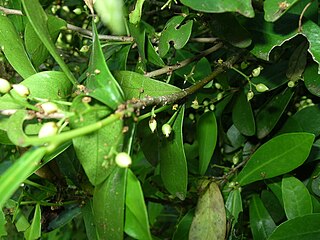
Daphnopsis is a plant genus in the family Thymelaeaceae. There are 50 to 65 species distributed in the Neotropics. They are shrubs and small trees with tubular or bell-shaped flowers. Individuals are dioecious, with male and female flowers produced on separate trees.
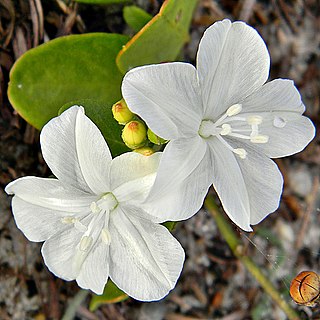
Jacquemontia is a genus of plants in the morning glory family Convolvulaceae. Species in this genus are commonly known as clustervine.

Varronia is a genus of flowering plants in the family Boraginaceae, found throughout Latin America, the Caribbean, and in the US states of Texas and Florida. They were resurrected from Cordia in 2007.
Barleriola is a genus of flowering plants belonging to the family Acanthaceae.
Stenostomum is a genus of flowering plant in the family Rubiaceae, native from southern Mexico to tropical South America. The genus was established by Karl Friedrich von Gaertner in 1806.














